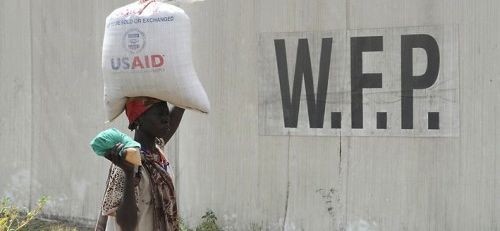The UN World Food Programme says that about 10% of its total stocks in South Sudan have been looted since the outbreak of conflict in mid December, making it more difficult to assist the 400,000 people displaced by violence.
WFP had pre-positioned food stocks at nearly 100 sites in South Sudan before the start of the crisis, owing to general food insecurity and the potential for disasters such as conflict, flooding or crop failure.
George Fominyen, Public Information Officer for WFP in South Sudan, said that the many sites where the agency stored food are now at risk or have already been looted.
“So far WFP estimates that about 10% of its food in the country has been looted at this period in time,” Fominyen told Radio Tamazj on Monday.
“Most but not all of this has been in Jonglei,” the information officer explained, adding that Bentiu facilities were also affected.
He added that the agency estimates the amount of food taken at more than 3,000 metric tons, which he said would feed about 180,000 people for a month The kinds of food taken include sorghum and special nutritious foods.
The spokesman declined to speculate on who looted the stocks, saying that some locations have changed hands several times between government and opposition forces, so that it would be difficult to say when exactly the stocks were taken and by whom.
On the other hand, Fominyen emphasized that WFP is still assisting people in spite of the looting and managed to reach at least 100,000 people in the country in various locations.
He called on the parties to respect humanitarian space and not loot food stocks, saying it would have a negative impact on the people.
Herding and agriculture disrupted
UN Food and Agriculture organization, for its part, has said that even before the fighting, 4.4 million people in South Sudan were estimated to be facing food insecurity in 2014.
“The violence risks reversing the modest gains that have been made in improving food security since Independence and, as livelihoods and assets are abandoned, could trigger a food security and nutrition crisis,” it said in a statement.
“Vital assets like livestock, food stocks and seeds have been abandoned or looted. The cold chain system for livestock vaccines has been severely damaged, undermining efforts to strengthen the system and increasing the risk of animal disease outbreaks – a potential public health hazard.”
FAO added that the insecurity has disrupted major commodity routes, damaging local markets and forcing traders to flee.
“Herders are unable to safely move with their livestock in search of water and pasture, and farmers face considerable challenges accessing their fields in time for the maize, groundnut and sorghum planting season that begins as early as March 2014 in some areas,” added the agricultural agency.
Photo: WFP distribution in Jonglei, January 2012 (UNMISS)




